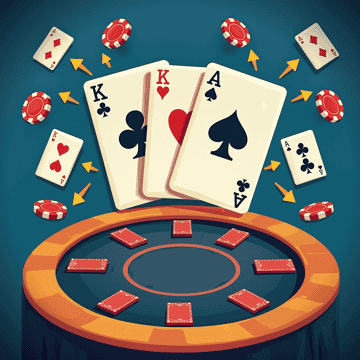- 1. Fold Weak Hands Early: If you have weak cards like 2-7, fold before the flop to save chips.
- 2. Watch Your Position: Fold more in early positions; better spots come later in the round.
- 3. React to Raises: If someone raises and you have a weak hand, it's best to fold.
Folding in poker can save a lot of chips and keep you in the game longer. Knowing which poker cards to fold is just as important as knowing when to bet big or go all-in. Many new players lose money because they don’t know which hands to let go.
Practice spotting weak hands when you're playing casual games. This will help you get better at folding. :)
We have played many rounds of Texas Hold'em and want to help you decide better. Our goal is simple: teach you how folding works, what hands need folding, and when it's smart to fold.

Every bit counts! Keep reading… you'll see it pays off!
Folding in poker conserves money
We play poker to win, right? Sometimes to win, we need to know when not to play a hand. Folding in poker means giving up your cards and leaving the current round. This happens when you think your hand is too weak.

Folding helps us avoid bigger losses. Imagine you're holding a bad set of cards like 2-7 unsuited (a real stinker). Rather than betting more money on this dud hand, you fold it away! This small action can save lots of cash in the long run.
Learn to fold when you need to. It's a key part of winning at poker in the long run. Keep in mind, sometimes winning means knowing when to quit.
Know when to give up in poker
Folding can be tough, right? But knowing when to fold your cards is key. One early sign is preflop positioning—if you’re not in a strong position, it might be wise to fold. Another clue comes after the flop—missing connections with community cards suggests folding could save you chips.
Folding before the turn
We all want to win at poker. Sometimes, we need to fold before the flop.
- ->Bad Starting Hands
Holding weak cards? Fold them right away. We should only play strong hands.
- ->Position Matters
Our seat at the table affects our chances. In early positions, fold more often.
Check out the pros of different table spots. It'll help you play smarter. It's kinda like picking where to sit at a dinner party—the right seat can totally change things!
- ->Opponent Raises
Did someone raise before us? If we have a weak hand, it's best to fold.
- ->Table Dynamics
Watch how others play. If they are aggressive, we may need to fold more hands.

- ->Pot Odds
Evaluate the pot size versus our call amount. If it’s not worth it, we fold.
- ->High-Risk Situations
Feeling unsure? Folding is safer than betting on risky hands.
After folding before the flop, let’s see what to do after the flop...
After the Flop
After the flop, things heat up in a poker game. You must decide about folding to stay strong.

- ->Evaluate Hand Strength: Check how strong your hand is now. Look at the new cards on the table. Do they help or hurt your hand?
- ->Board Texture: Is the board wet or dry? A wet board has many draws and potential hands. A dry board has fewer draws. On a wet board, be careful if you're holding a weak hand.
- ->Opponent’s Range: Think about what hands your opponent might have. Use their past actions to help guess their range.
- ->Pot Odds: Consider pot odds before making a decision. If you should risk more chips for a small pot, it might be time to fold.
- ->Opponent Tells: Watch your opponent closely for tells. Are they acting confident? Are they betting big? These can signal strong hands.
- ->Betting Patterns: Notice how your opponents bet after the flop. Consistent big bets could mean they have something good.
Sometimes folding is the right play even with a decent hand—don’t get caught with weak cards!
Save your chips by conceding these poker hands
Some hands aren't worth the risk in poker. Knowing which to fold can save us chips and keep us in the game longer.
Big pairs are powerful hands
High pairs are strong hands. We should rarely fold big pocket pairs like AA, KK, QQ, and JJ. These cards give us a good chance of winning most poker games.
When you have high pocket pairs, always check how other players are acting and betting before you decide to play or fold.
If our high pair is smaller than what’s on the table after the flop, we need to think twice.

Still, even medium pocket pairs (such as 55-88) can be worth playing in some cases if the betting isn’t crazy high. But low pocket pairs? They’re usually not worth it unless we hit three of a kind right off the bat.
Strong suited hands seldom fold
High suited cards like ace-king or ace-queen are strong. We should rarely fold these hands. These cards give us a chance to hit powerful combos. A flush or a straight can win big pots.

Suited hands with two Broadway cards (cards from ten to Ace) or an Ace also hold great value. They can connect well on the board and help in bluffing too. Knowing this helps us play smartly without folding good hands often!
Practice spotting good hands in poker. This helps you make better choices and boosts your chances of winning. I mean, who doesn't want to win? :)
Avoid high unsuitable cards
High suited cards sound good. But high unsuited cards? Not so much. Sure, they might seem tempting. They sure look strong with their high numbers and all, but don't get fooled.

With unsuited cards like King and Jack of different suits, your chances go down fast. You can't make a flush or straight as easily. So unless you have lots of chips or feel super lucky – better fold those hands! Stick to what works best in Texas Holdem poker and avoid these risky pairs.
Fold high, unsuited cards first. This way, you'll lose less money. Nobody wants to lose cash with useless cards, right? :)
Fold more than you think, but don't exaggerate it
We need to fold more than we think... but not too much!
Calculating when to fold in poker
Folding in poker involves some math. For example, if an opponent bets $100 into a $100 pot, the formula is $100/$200 x 100 = 50%. This means we need to win at least 50% of the time to make calling profitable.

Another key point is the Minimum Defense Frequency (MDF). MDF stops us from being too predictable. If our MDF is 50%, we should continue with half of our hands. Folding about 70% preflop often ends up as a winning strategy.
Mix up your game plan to keep your opponents guessing. You don't want them to know what you'll do next, do you?
Next: Avoid becoming "nitty".
Don't bend too often
Folding often is smart, but being too cautious can hurt us. We call this "nitty." A nitty player folds too much and misses good chances to win. In poker, balance is key. Fold when it's right, but don't be afraid to play strong hands or take calculated risks.

If we are always folding, other poker players will notice. They might start bluffing us more often because they think we'll fold every time. This can cost us chips and big pots in the long run...
Mix it up! Keep your opponents on their toes. Don't let them take advantage of your patterns. It's like hide and seek, but you're actually trying to win!
so it's all about finding that sweet spot! Stay sharp and watch for great opportunities without holding back too much.
Fold more against tight players, deceive aggressive opponents
To beat tight players, fold more often. These players don’t bluff much. So, we can avoid risk by folding weaker hands. Against aggressive opponents, it's a different story. They might bluff more often.
We should use weaker hands like middle pairs or bottom pairs to call their bluffs sometimes.

This keeps them guessing and stops them from exploiting us too easily.
Be patient and disciplined to avoid taking risks against tight players.
Watch how your opponent plays and adjust your poker strategy accordingly.
Stop Folding Too Frequently in Poker
Sometimes, we fold too much in poker. This can hurt our game.

- ->Analyze Past Hands:
- -> Check hands you folded that won later.
- -> Find patterns in your folding habits.
Check your folding choices often. This helps you see if you missed anything. You might even find a lost sock!
- ->Understand Pot Odds:
- -> Compare the pot size to the bet you need to call.
- -> Call bets with good pot odds more often.
- ->Study Your Opponents:
- -> Look for tells and betting patterns.
- -> Notice if they bluff frequently.
Pay attention to what your opponents do, so you can figure out what they'll do next. You know, because just guessing would be too simple!
- ->Consult Poker Tools:
- -> Use online tools like PokerTracker.
- -> Plug in different hands and scenarios to learn more.
- ->Practice More:
- -> Play online poker games for practice.
- -> Try free or low-stakes games to refine skills.

- ->Adjust Folding Frequency:
- -> Avoid becoming "nitty" (too tight).
- -> Fold less often against loose players.
- ->Learn from Pros:
- -> Watch videos of expert players.
- -> Note their strategies and adjustments on folding.
Next, we need to balance our game based on how often others fold...
Folding helps you prevent big losses in poker
Folding in poker is a smart move. It helps us avoid big losses and stay calm. Watch for bad hands before and after the flop. Knowing when to fold keeps our bankroll safe. Let's play smart and keep an eye on those cards!
Frequently asked questions
Players fold in poker when their cards are poor
Folding in poker means you give up your hand and any chance of winning the pot. You do this when you think your cards are not good enough.
When to fold weak hands
You should fold weak hands, like low pairs or unsuited connectors, especially if you're facing a strong bet from another player.
Fold when the dealer's cards do not enhance your hand
It's best to fold if the dealer's community cards don't help your hand, or if implied odds suggest you won't win much even if you get lucky.
Folding can preserve your chips
Yes! Knowing when to fold can save chips for better hands later on—think about it as avoiding bad beats and bluffs that could cost you big time.
Poker outs affect folding
An out is a card that will improve your hand significantly. If there aren't many outs left in the deck, it's usually smart to consider folding instead of chasing unlikely wins.



